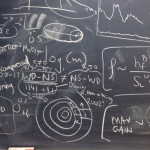Can We Know God’s Existence with Certainty?
by Dr. Edward Feser
Filed under The Existence of God
The Catholic Church makes some bold claims about what can be known about God via unaided reason. The First Vatican Council teaches:
"The same Holy mother Church holds and teaches that God, the source and end of all things, can be known with certainty from the consideration of created things, by the natural power of human reason…
If anyone says that the one, true God, our creator and lord, cannot be known with certainty from the things that have been made, by the natural light of human reason: let him be anathema."
In Humani Generis, Pope Pius XII reaffirmed this teaching and made clear what were in his view the specific philosophical means by which this natural knowledge of God could best be articulated, and which were most in line with Catholic doctrine:
"[H]uman reason by its own natural force and light can arrive at a true and certain knowledge of the one personal God, Who by His providence watches over and governs the world…
[I]t falls to reason to demonstrate with certainty the existence of God, personal and one… But reason can perform these functions safely and well only when properly trained, that is, when imbued with that sound philosophy which has long been, as it were, a patrimony handed down by earlier Christian ages, and which moreover possesses an authority of an even higher order, since the Teaching Authority of the Church, in the light of divine revelation itself, has weighed its fundamental tenets, which have been elaborated and defined little by little by men of great genius. For this philosophy, acknowledged and accepted by the Church, safeguards the genuine validity of human knowledge, the unshakable metaphysical principles of sufficient reason, causality, and finality, and finally the mind's ability to attain certain and unchangeable truth.
Of course this philosophy deals with much that neither directly nor indirectly touches faith or morals, and which consequently the Church leaves to the free discussion of experts. But this does not hold for many other things, especially those principles and fundamental tenets to which We have just referred…
If one considers all this well, he will easily see why the Church demands that future priests be instructed in philosophy "according to the method, doctrine, and principles of the Angelic Doctor," since, as we well know from the experience of centuries, the method of Aquinas is singularly preeminent both of teaching students and for bringing truth to light…"
Similarly, in his address to the Pontifical Academy of Sciences of November 22, 1951, Pius XII says:
"[T]he human intellect approaches that demonstration of the existence of God which Christian wisdom recognizes in those philosophical arguments which have been carefully examined throughout the centuries by giants in the world of knowledge, and which are already well known to you in the presentation of the "five ways" which the Angelic Doctor, St. Thomas, offers as a speedy and safe road to lead the mind to God."
The Catechism of the Catholic Church reaffirms the teaching of Vatican I and of Pius XII that God’s existence can be known with certainty by the natural light of human reason, and even teaches, more specifically, that we can “attain certainty” about God’s existence via “proofs” which begin “from movement, becoming, contingency, and the world's order and beauty.” Most of these are, of course, among the approaches taken by Aquinas’s Five Ways. In Fides et Ratio, Pope St. John Paul II also reaffirmed the teaching of Vatican I and Pius XII on the power of human reason in theological matters:
"[T]he First Vatican Council… pronounced solemnly on the relationship between reason and faith. The teaching contained in this document strongly and positively marked the philosophical research of many believers and remains today a standard reference-point for correct and coherent Christian thinking in this regard…
Against the temptations of fideism… it was necessary to stress the unity of truth and thus the positive contribution which rational knowledge can and must make to faith's knowledge…
Surveying the situation today, we see that the problems of other times have returned…
There are… signs of a resurgence of fideism, which fails to recognize the importance of rational knowledge and philosophical discourse for the understanding of faith, indeed for the very possibility of belief in God…
[M]odes of latent fideism appear in the scant consideration accorded to speculative theology, and in disdain for the classical philosophy from which the terms of both the understanding of faith and the actual formulation of dogma have been drawn. My revered Predecessor Pope Pius XII warned against such neglect of the philosophical tradition and against abandonment of the traditional terminology…
Pope Leo XIII… revisited and developed the First Vatican Council's teaching on the relationship between faith and reason, showing how philosophical thinking contributes in fundamental ways to faith and theological learning. More than a century later, many of the insights of his Encyclical Letter have lost none of their interest from either a practical or pedagogical point of view—most particularly, his insistence upon the incomparable value of the philosophy of Saint Thomas. A renewed insistence upon the thought of the Angelic Doctor seemed to Pope Leo XIII the best way to recover the practice of a philosophy consonant with the demands of faith."
To be sure, the Church has not officially endorsed any specific formulation of any particular argument for God’s existence. All the same, in her authoritative documents she has gone so far as to speak of God’s existence as something susceptible of “certainty,” “demonstration,” and “proof”; has commended “classical philosophy” specifically as providing the best means of showing how this is possible; and has held up Aquinas and the general approaches taken in his Five Ways as exemplary. Pius XII even went so far as to imply that the “metaphysical principles of sufficient reason, causality, and finality”—to which formulations of arguments like Aquinas’s typically appeal—are not only “unshakable” but are so connected to matters of faith and morals that they are not among the things to be left to “free discussion” among theologians.
Quod erat demonstrandum?
Needless to say, many modern readers find all of this baffling. They find it baffling that anyone could be so confident that God’s existence is demonstrable, and baffling that anyone could think it demonstrable in the specific way in question—via arguments like Aquinas’s Five Ways and metaphysical principles like the principle of causality, the principle of sufficient reason, etc. Indeed, they think it obvious that God’s existence is not demonstrable, and obvious that arguments like the ones in question do not work.
Though this attitude is common and even held with great confidence, there is no good justification for it. There are three main problems with it. The first is that those who exhibit it typically do not even understand what writers like Aquinas actually said, and aim their dismissive objections at crude caricatures. I have documented this at length in several places, and will not repeat here what I’ve already said elsewhere (such as in my book Aquinas, in my Midwest Studies in Philosophy article “The New Atheists and the Cosmological Argument,” and in articles at Strange Notions like this one and this one.) Suffice it to say that if a skeptic argues that cosmological arguments essentially rest on the premise that “everything has a cause,” or supposes that Aquinas was trying to prove that the world had a beginning in time, or suggests that Aquinas never explains why we should suppose a First Cause to have divine attributes like unity, omniscience, omnipotence, etc., that is an infallible sign that he is utterly incompetent to speak on the subject.
A second problem is that those who are dismissive of the very idea that the existence of God might be demonstrable typically hold arguments for God’s existence to a standard to which they do not hold other arguments. For instance, the mere fact that someone somewhere has raised an objection against an argument for God’s existence is commonly treated by skeptics as showing that “the argument fails”—as if an argument is a good one only if no one objects to it but all assent to it upon hearing it. Of course, skeptics do not treat other philosophical arguments this way. That an argument for materialism, or against free will, or whatever, has its critics is not taken to show that those arguments “fail.” The attitude in these cases is rather: “Well, sure, like any philosophical argument, this one has its critics, but that doesn’t mean the critics are right. At the end of the day, the objections might be answerable and the argument ultimately correct, and we need to keep an open mind about it and consider what might be said in its defense.” In general, even the most eccentric philosophical arguments are treated as if they are always “on the table” as options worthy of reconsideration. Mysteriously, though, arguments for God’s existence are refused this courtesy. The mere fact that Hume (say) said such-and-such two centuries ago is often treated as if it constituted a once-and-for-all decisive refutation.
Related to this is a tendency to approach the subject as if a successful argument for God’s existence should be the sort of thing that can be stated fairly briefly in a way that will convince even the most hardened skeptic. Again, no one treats other arguments this way. If a fifty page article on materialism, free will, utilitarianism, etc. fails to convince you, the author will say that you need to read his book. If the book fails to convince you, he will then say that the problem is that you have to master the general literature on the subject. If that literature fails to convince you, then he will say that the issue is a large one that you cannot reasonably expect anyone decisively to settle to the satisfaction of all parties.
By contrast, if you suggest that the existence of God can be demonstrated, many a skeptic will demand that you accomplish this in an argument of the sort which might be summarized in the space of a blog post. If such an argument fails to convince him, he will judge that it isn’t worth any more of his time, and if you tell him that he would need to read a book or even a large body of literature fully to understand the argument, he might even treat this (bizarrely) as if it made it even less likely that the argument is any good!
Then there is the common tendency to suggest that defenders of arguments for God’s existence have ulterior motives that should make us suspicious of their very project. Once again, the skeptic does not treat other arguments this way. He doesn’t say: “Well, you have to be very wary of arguments against free will or for revisionist moral conclusions, because their proponents are no doubt trying to rationalize some sort of activity traditionally frowned upon.” Nor does he say: “Atheist arguments are always suspect, of course, given that people would like to find a way to justify rejecting religious practices and prohibitions they find onerous.” For some reason, though, the very fact that a philosopher defends an argument for God’s existence is treated as if it should raise our suspicions. “Oh, he must have some religious agenda he’s trying to rationalize!”
Now there is no good reason whatsoever for these double standards. They reflect nothing more the unreflective prejudices of (some) atheists and skeptics, and in some cases maybe something worse—a dishonest rhetorical tactic intended to poison otherwise fair-minded people against taking arguments for God’s existence very seriously. But I submit that these unjustifiable double standards play a major role in fostering the attitude that there is something fishy about the very idea of demonstrating the existence of God.
A third, and perhaps not unrelated, problem with this attitude is that those who take it often misunderstand what a thinker like Aquinas means when he says that the existence of God can be “demonstrated.” What is meant is that the conclusion that God exists follows with necessity or deductive validity from premises that are certain, where the certainty of the premises can in turn be shown via metaphysical analysis. That entails that such a demonstration gives us knowledge that is more secure than what any scientific inference can give us (as “science” is generally understood today), in two respects. First, the inference is not a merely probabilistic one, nor an “argument to the best explanation” which appeals to considerations like parsimony, fit with existing background theory, etc.; it is, again, instead a strict deduction to what is claimed to follow necessarily from the premises. Second, the premises cannot be overthrown by further empirical inquiry, because they have to do with what any possible empirical inquiry must presuppose.
For example, Aristotelian arguments from motion begin with the premise that change occurs, together with premises to the effect that a potential can be actualized only by what is already actual (the principle of causality) and that an essentially ordered series of causes cannot regress to infinity. The first premise is in a sense empirical, which is why the argument is not a priori. We know that change occurs because we experience it. However, it is not a premise which can be overthrown by further empirical inquiry, because any possible future experience will itself be a further instance of change. (We can coherently hold, on empirical grounds, that this or that purported instance of change is unreal; but we cannot coherently maintain on empirical grounds that all change is unreal.) The other premises can be defended by various metaphysical arguments, such as arguments to the effect that the principle of causality follows from the principle of sufficient reason (PSR), and that PSR rightly understood can be established via reductio ad absurdum of any attempt to deny it. (See Scholastic Metaphysics for detailed defense of the background principles presupposed by Thomistic arguments for God’s existence.)
Now, the problem is this. Contemporary philosophers tend to work within a conceptual straightjacket inherited from the early modern philosophers. In particular, and where epistemological matters are concerned, they tend to think in terms inherited from the rationalists, the empiricists, and Kant. Hence when you put forward an argument that you claim is not an inference of empirical science, they tend to think that the only other thing it can be is either some sort of “conceptual analysis” (essentially a watered-down Kantianism) or an attempt at rationalist apriorism. And since arguments for God’s existence are obviously attempts to arrive at a conclusion about mind-independent reality itself rather than merely about how we think about reality or conceptualize reality, the assumption is that if you argue for God’s existence in a way that does not involve an inference of the sort familiar in empirical science, then you must be doing something of the Cartesian or Leibnizian rationalist sort.
As I argue in Scholastic Metaphysics, this is simply a false choice. Thomists reject the entire rationalist/empiricist/Kantian dialectic, and maintain an epistemological position that predated these views. But modern readers who are unfamiliar with this position, and falsely suppose that it must be an exercise in rationalist metaphysics, sometimes come to expect the trappings of rationalist metaphysics. In particular, they will expect geometry-style proofs, highly formalized arguments from axioms and definitions, which can be stated crisply in the course of a few pages and be seen either to succeed or fail upon a fairly cursory examination. When a Thomist does not put forward an argument in this style, the skeptic supposes that he has failed to produce a true demonstration. But this simply mistakes one kind of demonstration for demonstration as such, and begs the question against the Thomist, who rejects rationalist epistemology and methodology. (Students of the Neo-Scholastic period of the history of Thomism will be familiar with Thomist criticisms of “essentialism”—in Gilson’s specialized sense of that term, which is different from the way I or David Oderberg use it—and of “ontologism.” These are essentially criticisms of the Leibnizian rationalist approach to metaphysics and natural theology.)
Presenting theistic arguments in this pseudo-geometrical formalized style can in fact inadvertently foster misunderstandings, which is why I tend to avoid that style. You can, of course, set out an argument like the Aristotelian argument from motion in a series of numbered steps, as I do in my ACPQ article “Existential Inertia and the Five Ways.” However, the argument contains a number of crucial technical terms—“actuality,” “potency,” “essentially ordered,” etc.—which are not explained in the argument thus stated. Even if you somehow worked definitions of these key terms into the formalized statement of the argument, that would simply push the problem back a stage, since you would have to make use of further concepts not defined in the formalized statement of the argument. The idea that such an argument (or any metaphysical argument) could be entirely formalized is a rationalist fantasy.
The trouble is that by presenting such semi-formalized arguments—“Here’s the proof in ten steps”—you risk encouraging the lazier sort of skeptic in his delusion that if such an argument is any good, it should be convincing, all by itself and completely removed from any larger context, to even the most hostile critic. Naturally, it will never be that, because it will not properly be understood unless the larger conceptual context is understood. But the lazy skeptic will not bother himself with that larger context. He will simply take the brief, ten-step (or whatever) semi-formalized argument and aim at it any old objections that come to mind, thinking he has thereby refuted it when in fact he will (given his ignorance of some of the key background concepts) not even properly understand what it is saying. (That is why a reader of a book like my Aquinas has to slog his way through over 50 pages of general metaphysics before he gets to the Five Ways. There are no shortcuts, and I do not want to abet the lazy or dishonest skeptic in pretending otherwise.)
Now, I submit that when we take account of these three factors underlying the common dismissive attitude toward the very idea of demonstrating God’s existence—the widespread misconceptions about what the traditional arguments for God’s existence actually say; the arbitrary double standard to which these arguments are held; and the common misunderstanding of what a “demonstration” must involve—we can see that that attitude is simply not justified. Meanwhile, the approaches to demonstrating God’s existence represented by arguments like the Five Ways in fact are—when fleshed out and when correctly understood—convincing, as I have argued in several places (e.g. in Aquinas and in the ACPQ article).
The Church’s insistence that the existence of God is demonstrable is not, in any event, an attempt to settle a philosophical issue by sheer diktat. It is rather a carefully considered judgment about what must be the case if Christianity is to be rationally justifiable. What the Church is doing is distancing herself from fideism by affirming the power of unaided reason and affirming the duty of Christians to provide a rational justification of what Aquinas called the “preambles” of the Catholic religion. (I’ve discussed the crucial role that proofs of God’s existence and other philosophical arguments play in Christian apologetics here and here.) It is not an expression of blind faith but precisely a condemnation of blind faith.
So, something Catholics and New Atheists can agree on. Isn’t that nice?
Related Posts
Note: Our goal is to cultivate serious and respectful dialogue. While it's OK to disagree—even encouraged!—any snarky, offensive, or off-topic comments will be deleted. Before commenting please read the Commenting Rules and Tips. If you're having trouble commenting, read the Commenting Instructions.













